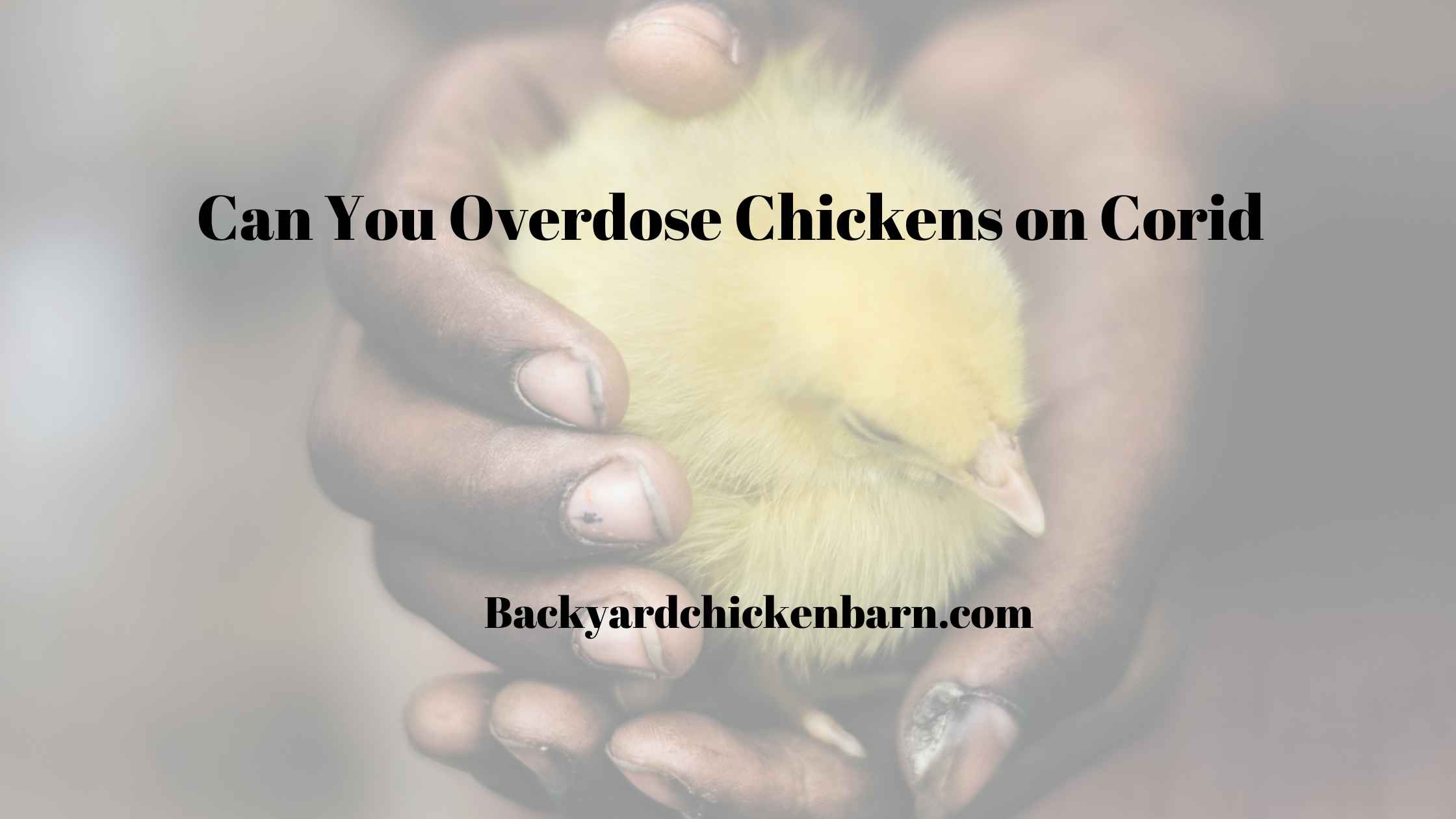Can You Overdose Chickens on Corid? [SEE HERE]
Corid, or amprolium, is commonly used to treat coccidiosis in chickens. Coccidiosis is an intestinal parasitic disease caused by a protozoan.
When used correctly, Corid can be an effective remedy against this ailment.
However, like all medications, there’s a potential for overdosing, which can have implications for your chickens.
1. How Does Corid Work?
Corid works by mimicking thiamine (Vitamin B1), which the coccidia parasite requires to multiply.
By inhibiting the absorption of thiamine, Corid effectively starves the parasite, halting its growth and spread.
2. Overdosing Risks
Given that Corid acts by blocking thiamine absorption, prolonged use or excessive dosages could potentially result in thiamine deficiency in chickens.
Thiamine is vital for various metabolic processes, and a deficiency can lead to neurological issues and other health problems.
3. Signs of Overdose
Chickens that have been overdosed on Corid or given the drug for an extended period may exhibit:
- Lethargy or decreased energy
- Loss of appetite
- Weakness or difficulty walking
- Neurological symptoms like tremors, convulsions, or paralysis
4. Prevention
To prevent overdosing:
- Follow Dosage Instructions: Always follow recommended dosages based on the product label or veterinarian advice.
- Limit Treatment Duration: Generally, treatment with Corid shouldn’t exceed the recommended days unless directed by a vet.
- Avoid Using with Other Meds: Combining Corid with other medications without veterinary guidance can amplify risks.
5. What to Do in Case of Overdose
If you suspect your chickens have been overdosed:
- Stop the Medication: Discontinue Corid treatment immediately.
- Administer Thiamine: If possible, give the chickens thiamine injections to counteract the effects. Always consult with a vet about dosages and administration.
- Hydrate and Support: Ensure your chickens are well-hydrated and have access to a balanced diet.
- Consult a Veterinarian: Always reach out to a veterinarian if you suspect an overdose. They can provide guidance on supportive care and recovery.
Conclusion
Corid can be a lifesaver for chickens affected by coccidiosis, but as with all medications, it should be used responsibly and in the correct dosages. If in doubt, always err on the side of caution and consult with a professional.
Proper care and attention to your flock’s health will ensure they remain happy, healthy, and productive.
ALSO SEE: How to Pop a Chicken’s Leg Back into Place

FAQs: Corid and Chickens
- What is Corid used for in chickens?
- Corid is primarily used to treat and prevent coccidiosis, an intestinal parasitic disease in chickens.
- How does Corid work against coccidiosis?
- It works by mimicking thiamine (Vitamin B1) to inhibit its absorption, which starves and kills the coccidia parasite.
- Can Corid be used as a preventative measure?
- Yes, Corid can be used both for treatment and as a preventative measure against coccidiosis outbreaks.
- How long should I treat my chickens with Corid?
- Typically, treatment lasts for 5-7 days, but always follow the product label or veterinarian’s advice.
- Can I give my chickens too much Corid?
- Yes, like all medications, there’s a potential for overdosing which can lead to side effects.
- What are the symptoms of Corid overdose in chickens?
- Symptoms may include lethargy, loss of appetite, weakness, and neurological symptoms like tremors or paralysis.
- How do I administer Corid to my chickens?
- Corid can be administered via drinking water or as a drench.
- Can I eat the eggs from chickens being treated with Corid?
- It’s recommended to discard eggs from hens under treatment and for a few days after to ensure no drug residues.
- Is Corid safe for all ages of chickens?
- Yes, but always follow recommended dosages and consult with a vet if unsure.
- Can I use Corid for other poultry like ducks or turkeys?
- While it’s primarily for chickens, it can be used for other poultry. Consult a vet for appropriate dosages.
- Can I mix Corid with other medications?
- It’s generally not recommended unless under the guidance of a veterinarian.
- How should Corid be stored?
- Store in a cool, dry place away from direct sunlight.
- Is there a withdrawal period for Corid?
- There isn’t a specific withdrawal period, but it’s advised to wait a few days before consuming eggs or meat.
- How often should I use Corid as a preventative?
- Using Corid regularly as a preventative isn’t generally advised. It’s best used during high-risk periods or after confirmed outbreaks.
- Is Corid the only treatment for coccidiosis?
- No, there are other medications and treatments, but Corid is one of the most popular.
- Can I vaccinate my chickens against coccidiosis?
- Yes, vaccines are available for coccidiosis prevention.
- What causes coccidiosis in the first place?
- It’s caused by protozoa of the genus Eimeria, which chickens might ingest from contaminated soil or water.
- Are there natural remedies for coccidiosis?
- While some natural treatments are touted, their efficacy isn’t as proven as commercial medications.
- How do I know if my chicken has coccidiosis?
- Symptoms include bloody stools, lethargy, reduced appetite, and fluffed feathers.
- Is coccidiosis contagious among chickens?
- Yes, it can spread rapidly among a flock.
- Can humans catch coccidiosis from chickens?
- No, the strains of coccidia that affect chickens don’t infect humans.
- Can I overdose a chicken with Corid?
- Yes, excessive or prolonged dosing can lead to thiamine deficiency.
- What should I do if I suspect an overdose?
- Discontinue Corid, provide supportive care, and consult a veterinarian.
- How quickly does Corid work?
- Symptoms often improve within a few days, but the full course of treatment is essential.
- What if Corid doesn’t seem to be working?
- If there’s no improvement, it’s possible that another ailment is present or the coccidia strain is resistant. Consult a veterinarian.
- Is there any resistance to Corid?
- Some resistance has been reported, making it important to use as directed and not overuse.
- Where can I buy Corid?
- Most farm supply stores, veterinary clinics, and online retailers stock Corid.
- Is Corid safe for pregnant or laying hens?
- Yes, but always adhere to dosage recommendations and consult with a vet.
- Can I give Corid with vitamins and supplements?
- It’s best to avoid other supplements, especially those with thiamine, while administering Corid.
- How can I prevent coccidiosis without Corid?
- Good hygiene, clean water, regular cleaning of coops, and proper nutrition can help prevent outbreaks.
- Can chicks be given Corid?
- Yes, but ensure you’re giving the appropriate dosage for their weight and age.
- Can Corid harm beneficial gut bacteria in chickens?
- While its primary target is coccidia, it’s always a good idea to provide probiotics after treatment.
- How does coccidiosis spread?
- Mainly through ingestion of oocysts from contaminated soil, water, or equipment.
- Are there side effects to using Corid?
- When used as directed, side effects are minimal but overdosing can lead to thiamine deficiency.
- Can I use Corid in combination with antibiotics?
- Generally, combining medications should be done under the guidance of a veterinarian.
- How often should I clean the coop during a coccidiosis outbreak?
- Daily cleaning is ideal to remove feces and reduce oocyst numbers.
- Can I use Corid for broilers?
- Yes, but follow dosing instructions and be aware of potential withdrawal times.
- What’s the difference between Corid liquid and powder?
- Both are effective; the choice comes down to personal preference and ease of administration.
- Do other animals get coccidiosis?
- Yes, it affects many species, but strains are often species-specific.
- Is coccidiosis fatal for chickens?
- If left untreated, coccidiosis can be fatal, especially for younger birds.
Always consult with a veterinarian for specific guidance related to your flock’s health.


